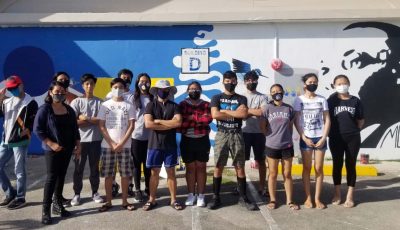I have a dream
MLK Jr. was actually diminutive in physique (an inch taller than I when we met). He was rotund and looked indolent but what he lacked in physical presence, he made up with the unmistakable aura of one who was «special.» That›s how we regard our «dreamers» and if Martin was anything, he was definitely a dreamer!
I was just 18 when his voice thundered in Abe Lincoln›s shadow down the reflecting pool of the National Mall. The year was ‹63, and I was a strapping lightweight radio announcer in northern Philippines sounding like I knew what I was talking about. I played the speech over and over again and the first LP album I bought when I reached stateside in ‹65 was called «In White America» that had the recording.
Two months after the speech, I announced the assassination of JFK, a young President in a motorcade downtown Dallas, Texas, where I later went to school. LBJ of Texas was next in command, later President just about the time I walked into a «for white only» washetaria sign near the Hilton on Central Expressway in Highland Park. The endowed Mustangs of Southern Methodist U and the Dallas Cowboys both played in the Cotton Ball.
Not a fan of LBJ as he launched an incomprehensible war in Southeast Asia›s Yue who lowered French pride a notch—Hanoi and Saigon were unfriendly to the gendarmes—while waging a war on poverty. When the Vietnam conflict flared up in ‹64, it was the year oil in the magnitude of Kuwait was confirmed in the South China Sea. We only connected the dots later. At the time, democracy vs. communism was the rhetoric, not the tar sheen that later made many rich in the Arabian peninsula.
MLK Jr. used the metaphor of a «dream,» inviting the whole country to dream with him. Not five years later, he himself bit the bullet at dusk when his voice was stilled on a Lorraine motel balcony in Memphis, Tennessee.
I bumped into the legendary civil rights activist before his April assassination, in February ‹68 in Washington, D.C. where he led a march against the War in Vietnam in preparation for the Poor People’s March. By then, he had moved from civil rights to human rights, right down my alley.
This pintsize former DJ from northern Luzon, not yet 23, marched with a group from the New York Ave. and 13th St. Presbyterian Church where MLK spoke to a captive audience to lock arms with prominent figures through the front of the WH on Pennsylvania Avenue across the George Washington Bridge spanning the Potomac to Arlington, Virginia. The joint anti-war/civil rights group dramatized the practical ties between the resource-draining Vietnam War that divided the nation, and the War on Poverty that touched its compassion but was getting no financial support.
The most quoted part of MLK›s extempore is the fourth rhetorical line in the litany: “I have a dream that my four little children will one day live in a nation where they will not be judged by the color of their skin, but by the content of their character.” Liberation. Freedom. Justice. Peace. Dreamers in history march to the same coda.
The dreamer fascinates. Most are elevated into Olympus beyond the reach of mortals. Moses, the stammering leader of the Hebrews, led an exodus out of Egypt and became Cecille de Mille’s Charlton Heston. Heroes fly into the pyramidal tip of superstardom. In my time, Jesus Christ Superstar parodies this phenomenon, but the Greeks earlier sent Jesus to replace Zeus and the Romans made him a transcendent Caesar in the cathedral!
Muslims do not idolize their prophet and al-lah means the “no thing”; Araby’s movement is devoid of images of a person, but they made an icon of the Koran in the same way as the Jews now treat the Torah, emulated by Christians who tacked-in Paul’s epistles and the Gospels to create the idolatry of Jesus under the architectonic magnificence of the medieval ecclesia and King James blessings of the biblos (the books, aka, the Bible).
We turned the diminutive figure of my brief acquaintance into a chiseled Georgia limestone. In MLK’s time, psychological counseling was in vogue in the healing ministries. Depressed under duress became a stressful justification for MLK’s slippage into the welcoming arms of ladies.
Prominent was Georgia Powers, the first black and female senator elected to the Kentucky Senate. She was MLK’s year-old lover just before he died. Six-year senior to the civil rights activist, she provided him comfort on his last night at the Lorraine Motel where he was gunned down. In the Memphis dusk scene, she alighted to the ambulance that took Martin’s body away but Jesse Jackson held her back.
Real heroes are like us, often politically incorrect. We join folks because they resemble our dreams rather than voice tone of authority. Even Ambrose Bennett has his bad hair days! My picture of MLK is earthy. He thundered into dreams, but like many of us, he drew up his pants one leg at a time. Fifty-years after MLK’s dream, Obama edged home into the White House.


























